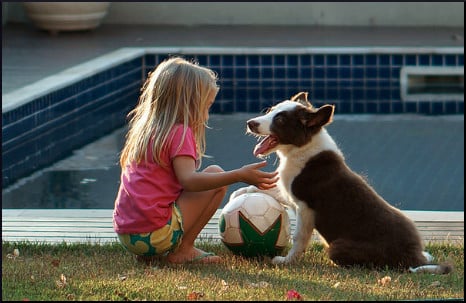
When Childhood Obesity News discusses animals, it is often in the context of their therapeutic functionality. To play their important role in treating childhood obesity, they don’t need to have fancy training. As Dr. Pretlow points out in Overweight: What Kids Say, even mundane activities count. If a child can take a dog for a walk, instead of walking to get a hot dog, so much the better.
Of course there are many anecdotal reports from all over the world, of children’s physicality being enhanced by the presence of pets. In his book, Dr. Pretlow quotes 16-year-old Tricia:
I got a dog. He’s wonderful. He’s my friend and we take walks together every day, even we jog some. That keeps me from heading for the fridge all the time…
In 2010, a University of London study of kids in the central city found that children in dog-owning homes tend to get more exercise. However, BBC journalist Sean Coughlan noted that:
[…] researchers are still not sure whether this is a case of more active families being more likely to own a dog — or if owning a dog makes an otherwise sedentary family more active.
Pets can provide comfort and exert a relaxing influence that relieves the stress in many lives. They can be an antidote to boredom, especially if a child takes up an activity like volunteering at the local animal shelter.
Apparently there can be a downside. Britain’s National Obesity Observatory said this about the relationship between common mental health disorders, lower activity levels, unhealthful diets, and obesity:
For example, a qualitative study of 10-12 year old overweight Scandinavian children found that whilst they yearned to be part of a community, they spent a lot of time alone eating, watching television, playing computer games and taking care of pets. They were aware of healthy lifestyles, but did not manage to implement them in practice…
So, having a pet is no guarantee of increased physical activity or extroversion. Keeping a hamster or some fish will not increase a child’s physical activity, and no one would expect it to.
But some pets can do wonders. We have seen them described as companion animals in the movements known as green care and social farming. This post, “Animals, Obesity and Green Care,” is particularly dog-intensive. Psychiatric patients benefit from ecotherapy, as do those with learning disabilities, and the addicted, the stressed-out, and the obese. Three demographic groups are very open to this kind of influence — children, the elderly, and developmentally impaired people.
Our post titled “Motivation From Virtual Pets” covered an innovative therapeutic mode pioneered by the University of Georgia, in which the child is paired with an obese virtual dog. When the child increases her or his exercise level and drops weight, the result is reflected in the virtual pet. We also talked about an activity-tracking device called LeapBand which includes games and activity challenges connected to an imaginary pet.
Your responses and feedback are welcome!
Source: “Children ‘more active’ in homes with dogs,” BBC.com, 09/22/10
Source: “Obesity and Mental Health,” NOO.org, March 2011
Photo credit: Edu Alpendre via Visualhunt/CC BY-SA

 FAQs and Media Requests:
FAQs and Media Requests: 











